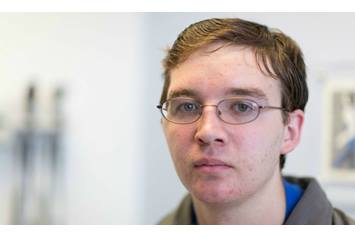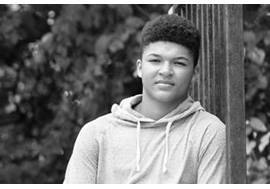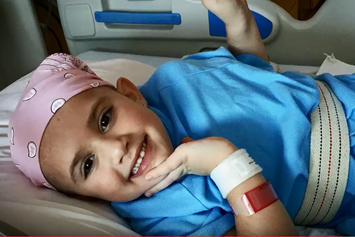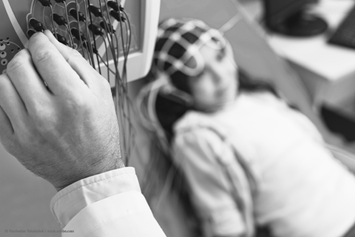Epilepsy Surgery
Providing Help and Hope for Children with Difficult to Control Epilepsy
Inside Our Level 4 Epilepsy Center
Watch Here
Epilepsy Surgery
Childhood-onset epilepsy affects 1% of children worldwide. Of those children, about one-third will have medically intractable epilepsy. This means the child will continue to have seizures despite using two or more antiseizure medications. In these cases the seizures are frequent, severe and affect quality of life. Treatment options for these patients include:
- Epilepsy surgery
- Neuromodulations (such as responsive neurostimulation (RNS) and vagus nerve stimulator (VNS) insertion)
- Ketogenic diet
- Drug clinical trials
Epilepsy surgery may dramatically improve the quality of life for these children and is the only potential cure.
At Nationwide Children’s, we are leaders in the growing field of epilepsy surgery. The team includes epileptologists, who are neurologists who specialize in treating epilepsy. Our epileptologists work with families to explain treatment options, how each option works, and the associated risks and benefits. The epilepsy care team is devoted to providing the best option for seizure management for each patient. The team works closely with your child's primary care provider to coordinate patient care.

Nationwide Children's Hospital is ranked by U.S. News & World Report for Neurology and Neurosurgery.
How to Decide if Surgery Is the Right Choice for Your Child
The first step to find out how to treat your child’s epilepsy is to schedule tests that tell us about the location and type of seizure. This will also tell us what treatment option will work best. Your child may have received some of these tests before coming to Nationwide Children’s. Our team may use those as part of our evaluation.
For patients whose epilepsy is not well controlled with medication, the neurologist may suggest phase 1 epilepsy monitoring. This test involves a multiple day stay in the hospital, prolonged video electroencephalogram (EEG) and observation of your child’s seizures.
Types of Diagnostic Procedures
Diagnostic studies for surgery evaluation include some or all of the following:
- 24-hour, long-term video EEG scalp and intracranial monitoring
- Diffusion tensor imaging (DTI)
- Functional magnetic resonance imaging (fMRI)
- High field, detailed MRI
- Cognitive and neuropsychological evaluation
- Fluorodeoxyglucose positron emission testing (PET)
- Routine digital/video EEG
- Intra-operative and extra-operative studies to localize language and motor functions
- Single photon emission computed tomography (SPECT)
What Are the Surgical Options for Epilepsy?
Every child’s epilepsy surgery journey is unique. Some children may be recommended for surgery, and some will not. When your child’s testing is complete, our team of doctors, nurses, and other healthcare professionals will meet to review your child’s case. This is a medical/surgical conference. You will not attend this meeting, but we will contact you shortly after to discuss our recommendations. The next steps may include one of the following.
Surgical investigation when more information is needed:
- Stereoelectroencephalography (SEEG) – A procedure that inserts electrodes deep into the brain using robotic stereotactic assistance to find areas where seizures begin. This test involves long-term EEG monitoring and will use stimulation to find areas responsible for functions such as language and motor skills.
- Craniotomy – This procedure involves surgical opening of the skull to place a grid of electrodes on the surface of the brain to locate seizure area(s). This test involves long-term EEG monitoring and will use stimulation to find areas responsible for functions such as language and motor skills. It may be followed by surgical removal of the seizure area.
Surgical treatment to permanently stop or lessen seizures:
- Resection (aka “single stage”) – A procedure to remove the area of the brain causing the seizure.
- Laser ablation – A minimally invasive procedure that uses a precisely placed wire and laser to eliminate the area of the brain causing a seizure.
- Hemispherotomy – A procedure that disconnects the right and left sides of the brain from each other when one half is causing seizures.
- Hemispherectomy – A procedure that totally or partially remove the half of the brain when one half is causing seizures.
Surgical treatment to make a child’s epilepsy more manageable:
- Corpus callosotomy – A procedure that prevents seizures from spreading from one half of the brain to the other by disconnecting the corpus callosum. The corpus callosum connects the left and right sides of the brain.
Implanting a device to make a child’s epilepsy more manageable: This is known as neuromodulation therapy and may involve one of the following options, based on your child’s unique needs:
- Vagus nerve stimulation (VNS) – A device is implanted and connected to a vagus nerve in the neck where it delivers a constant series of electrical impulses, which are carried to the brain through the vagus nerve.
- Responsive neurostimulator (RNS) – A device is implanted to monitor brain waves where seizures occur. When signs of a seizure are detected, the device gives electrical pulses to help avoid a seizure.
- Deep brain stimulation (DBS) – A device is implanted with thin wires (electrodes) that deliver a constant series of electrical impulses to the brain to help prevent seizures or reduce their frequency.
Meet the Epilepsy Surgery Team
It's not just who treats your child that makes a difference at Nationwide Children's. It's how your child is treated here. Helping children and teens feel better is our purpose and what drives us each day. It's why we do what we do.
Epilepsy surgery in children is different than in adults. Treating epilepsy during childhood gives the brain time to heal and regain function. That's why your child needs a dedicated health care team who understands how a child's brain grows and develops.
Our epilepsy surgery team includes many health care specialists such as neurosurgeons, neurologists, psychologists, radiologists and nurses who understand the pediatric brain.
Epilepsy Surgery Team Leadership

Adam Ostendorf, MD
Adam Ostendorf, MD, is an attending pediatric neurologist at Nationwide Children's Hospital and assistant professor of Clinical Pediatrics and Neurology at The Ohio State University College of Medicine.

Ammar Shaikhouni, MD, PhD
Ammar Shaikhouni, MD, PhD, is a pediatric neurosurgeon at Nationwide Children’s Hospital and assistant professor of neurological surgery at The Ohio State University College of Medicine.
Related Specialties
Your child will have access to doctors and other medical professionals who are experts in different types of medical care. We call this multidisciplinary care. Our team includes:
- Pediatric neurologists and epileptologists (doctors who specialize in treating epilepsy)
- Pediatric neurosurgeons (doctors who diagnose and treat conditions that affect the nervous system — brain spinal cord and nerves)
- Pediatric ophthalmologists (doctors who specialize in eye and vision care)
- Pediatric nurse practitioners
- Clinical pharmacists
- Pediatric neuropsychologists, psychologists and behavioral specialists. (Neuropsychologists study how brain injuries and conditions impact behavior, mood, and thinking skills.)
- Clinical social workers
- Epilepsy Foundation educators
- Child Life specialists
- Dietitians
- Genetic counselors
- Pathologists
- Neurodiagnostic technicians (specialists who perform tests that diagnose brain and nervous system disorders)
- Nuclear medicine specialists
- Neuroradiologists (a doctor who uses medical imaging equipment, such as X-rays or computerized tomography (CT) scans, to identify and diagnose neurological diseases and disorders)
- Administrative support
Why Choose Nationwide Children's for Epilepsy Surgery?
Comprehensive pediatric epilepsy care requires unique specialists, leading technology, and an ongoing partnership with referring physicians. But at Nationwide Children’s we believe in taking it to the highest level. That’s why the National Association of Epilepsy Centers (NAEC) has accredited the Epilepsy Center at Nationwide Children’s as a Level 4 epilepsy program—a designation reserved for programs offering the highest level of comprehensive and specialized care.
The Level 4 Epilepsy Center at Nationwide Children’s includes a cutting-edge Neurodiagnostics Program with an advanced Epilepsy Monitoring Unit (EMU). Accredited by the National Association of Epilepsy Centers (NAEC), the EMU is a unit specifically designed for children to receive long-term EEG monitoring before and after surgery. The EMU is staffed 24 hours a day, seven days a week, by registered nurses and EEG technicians who are certified by the American Board of Registration of Electroencephalographic and Evoked Potential Technologists (ABRET).
Behind the Scenes on the Epilepsy Unit
Inside Epilepsy Surgery

Meet Gaige
When the seizures started at 3 years old, Gaige had a couple per week. As he grew, they became more frequent and difficult to manage. At one point, Gaige was having nine to 10 seizures a week, sometimes more than one in the same night.






